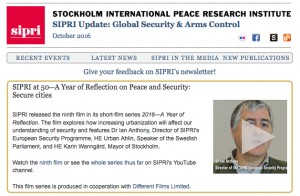Stockholm International Peace Research Institute, SIPRI, at 50. Now Change Name to SIMSI
TRANSCEND MEMBERS, 31 Oct 2016
Jan Oberg | Transnational Foundation for Peace & Future Research – TRANSCEND Media Service
 27 Oct 2016 – Is there a new cold war? And what steps can be taken by whom to reduce tension and make peace?
27 Oct 2016 – Is there a new cold war? And what steps can be taken by whom to reduce tension and make peace?
Indeed highly relevant issues in an era of European history where the characteristics of a new Cold War are becoming ever more significant. And a good intellectual way to celebrate an important research institute’s 50th Anniversary, namely SIPRI – Stockholm International Peace Research Institute.
Now, what was this SIPRI supposed to be 50 years ago as the brainchild of, among others, brilliant visionary sociologist and social democratic politician Alva Myrdal who later became Sweden’s disarmament ambassador, wrote an impressive book on disarmament and security and received the Nobel Peace Prize in 1982?
If you go to its entry at Wikipedia, it is very clearly spelled out in 1966 (my italics):
“A Swedish Royal Commission chaired by Ambassador Alva Myrdal proposed in its 1966 report to establish an institute, later named the Stockholm International Peace Research Institute, SIPRI. The Institute’s research should seek to contribute to “the understanding of the preconditions for a stable peace and for peaceful solutions of international conflicts” and the Commission recommended that research be concentrated on armaments, their limitation and reduction, and arms control. The Commission also recommended that SIPRI work be of “an applied research character directed towards practical-political questions [which] should be carried on in a constant interchange with research of a more theoretical kind”.”
However, here is today’s research programs of SIPRI – also from Wikipedia:
- The SIPRI Yearbook
- Euro-Atlantic Security and Arms Control
- Armed Conflict and Conflict Management
- Non-Proliferation and Export Controls
- Chemical and Biological Warfare
- Military Expenditure and Arms Production
- Arms Transfers
- IT Projects: “Facts on International Relations and Security Trends” and “An Internet-Based Early Warning Indicators System for Preventive Policy”
The character of this program is pretty obvious:
SIPRI studies wars and arms and very little, if at all, peaceful solutions to international conflicts and the – theoretical – conditions of a stable peace.
So here are some videos in which four members of the international Governing Board of SIPRI answer those questions.
Two of them are mainstream international relations scholars, one British, one Russian. One, the head of the Board, is a Swedish diplomat not known for his independent thinking – as also comes through here. He blames Russia for all Europe’s problems, for not accepting a rule-based international order and changing borders (as if it were the only one!) and believes that withdrawal from Crimea is the first step towards preventing a new cold war and that “the whole world has to say No to Georgia’s being divided by Russian aggression. See, now you understand it all much better!
The fourth is a German diplomat who is related to finance management and chairs the highly mainstream, militarist Munich Conference on Security Policy. He has recently argued, in diplomatic terms of course, that dictator al-Assad should have been removed earlier, that Russia should have been countered by a Western intervention in Syria and that we must save both “pax americana” and the liberal international order. See, a true peace-thinker!
None of the four board members have a background in academic peace research.
When I saw the videos I asked myself a couple of “anniversary” questions and here they are with my short answers:
- Do they talk in reasonably sharp intellectual terms?
No! It’s mainly some small-talk political commentary with no originality or theory. No perspective of history or of what the future may bring. - Do they have any new and sparkling ideas about how to make peace?
No! Except what they in their narrow “school of thought” believe can be done by military means and by governments. None of them seem to have a concept of peace on which to base their words and more or less lofty personal wishes for the future: “I would like to see that..” which has also nothing to do with research. - Is this anything but traditional international relations, geopolitical-military or political science commentary in what they say?
No! They share a government perspectives, no civil society aspects, no linking to democracy or identification of things that should be researched more. No re-searching mind. All seem quite tired if not re-tired. - Does it have anything to do with peace research?
No! Words like conflict-resolution, nonviolence, peace-making, reconciliation, dialogue etc. don’t seem to be on their radar. The only thing in common seems to be the Russian, German and British voice advocating joint projects and a strengthening of the OSCE. The EU is mentioned once: that it should put peacekeeping troops on the ground in Aleppo (!). And the UN? The UN, the global movement for disarmament and security, the changing world order, development issues – not a word! Also not a word about peace education or the possible role of media in providing both war reports and peace stories.
My congratulations at the 50th Anniversary of SIPRI, this once so promising, innovative institution! I know it was promising because I interned at SIPRI on and off for weeks as a young student in the 1970s when it was at the Wennergren Center sky scraper – leadership sitting at the top floor, those doing newspaper clippings on the lower floors. I’ve written reviews of SIPRI’s amazing Yearbooks and many special studies, not the least in the Danish daily Politiken in the 1970s and 1980s.
I got the greatest respect for the meticulous data collecting – “bean counting” – from only open sources that SIPRI is still very good at. (But that isn’t peace research).
I vividly remember the seminars and the dynamic leadership of its scholar-director, amazing Frank Barnaby whose knowledge about nuclear weapons and nuclear policies and passion for nuclear abolition impressed everyone who met him and listened to his dark rusty voice. I silently wonder whether such a character would be invited to SIPRI today?
In all friendliness, I have a proposal to make for the next decades of this mainly government-financed and not exactly independent institute as it professes to be:
Since its work has so conspicuously little to do with peace thinking and re-search into the vast and fascinating field called world peace, perhaps it’s time to change name to Stockholm International Military Security Institute, SIMSI?
__________________________________
TFF Director Prof. Jan Oberg is a member of the TRANSCEND Network for Peace, Development and Environment.
Go to Original – transnational.org
DISCLAIMER: The statements, views and opinions expressed in pieces republished here are solely those of the authors and do not necessarily represent those of TMS. In accordance with title 17 U.S.C. section 107, this material is distributed without profit to those who have expressed a prior interest in receiving the included information for research and educational purposes. TMS has no affiliation whatsoever with the originator of this article nor is TMS endorsed or sponsored by the originator. “GO TO ORIGINAL” links are provided as a convenience to our readers and allow for verification of authenticity. However, as originating pages are often updated by their originating host sites, the versions posted may not match the versions our readers view when clicking the “GO TO ORIGINAL” links. This site contains copyrighted material the use of which has not always been specifically authorized by the copyright owner. We are making such material available in our efforts to advance understanding of environmental, political, human rights, economic, democracy, scientific, and social justice issues, etc. We believe this constitutes a ‘fair use’ of any such copyrighted material as provided for in section 107 of the US Copyright Law. In accordance with Title 17 U.S.C. Section 107, the material on this site is distributed without profit to those who have expressed a prior interest in receiving the included information for research and educational purposes. For more information go to: http://www.law.cornell.edu/uscode/17/107.shtml. If you wish to use copyrighted material from this site for purposes of your own that go beyond ‘fair use’, you must obtain permission from the copyright owner.

Thanks for the article Jan, it reminded me of some of Galtung’s comments in a video that I sadly can’t find now (it was a series of interviews with several people from the founding era of peace research). Essentially he said that SIPRI and PRIO have become security studies, and I tend to agree with him.
I don’t want to paint PRIO (and SIPRI for that matter) with a too broad and black brush, because I know they do good work as well, but it’s hard to escape the impression that there isn’t that much difference between them and most other “security” studies institutes out there.
In big fonts on the home page we can read: “The Peace Research Institute Oslo (PRIO) conducts research on the conditions for peaceful relations between states, groups and people.”
But looking at this list of projects, I can’t honestly say that the above is particularly well-reflected: https://www.prio.org/Projects/
Look through their Data page, and we can read about
-Data on Armed Conflict
-Small Arms Trade Database
-Mapping Arms Data.
Not unimportant tasks of course, but should this be the bulk of what a peace research institute develops data on?
It’s easier to get funding for military-ish projects I suppose. A reflection of the priorities in the world :(
Incredible, I actually found the video: https://www.youtube.com/watch?v=CDbiJ3z8-vw
Here’s the whole series: http://scar.gmu.edu/parents
Forgot to say, but it was genuinely embarrassing to listen to that Swedish bloke in the SIPRI videos. The others were at least sort-of living on planet Earth.
Dear Per-Stian
Thank you for the links to this great collection on genuine peace researchers.
Yours
Werner T. Meyer